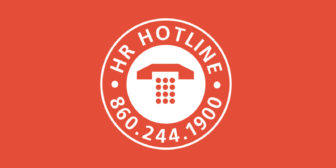State’s Minimum Wage Rising 3.6% in 2026

Connecticut’s hourly minimum wage will increase 3.6% to $16.94 from Jan. 1, 2026.
A state law enacted in 2019 implemented five annual increases in the hourly wage and tied future yearly increases to the U.S. Department of Labor’s Employment Cost Index.
The last of those five statutory increases took effect in 2023, when the hourly wage hit $15.
Future increases are calculated based on the change in the ECI “over the 12-month period ending June 30 of the preceding year, rounded to the nearest whole cent.”
The second of those indexed increases took effect Jan. 1 this year, with the minimum wage rising 4.2% to $16.35.
The state’s hourly minimum wage is currently fifth highest in the U.S. after the District of Columbia ($17.50), Washington state ($16.66), California ($16.50), and New York City and Nassau, Suffolk, and Westchester counties ($16.50).
High-Wage State
In July 2025, average private sector hourly earnings in Connecticut stood at $38.78, up 4% over the previous 12 months.
CBIA president and CEO Chris DiPentima said Connecticut was among the top five states for wages and wage growth.
“It’s just such a competitive environment,” he told the Connecticut Mirror. “Obviously businesses are doing everything they can with higher minimum wages and flexible benefits.”
In July 2025, average private sector hourly earnings in Connecticut stood at $38.78.
Connecticut’s cost of living is among the highest in the country, driven by the state’s tax burden and high energy, housing, and childcare costs.
Fifteen states link annual changes in the minimum wage to various indexes, with Virginia (2026), Nebraska (2027), and Florida (2028) all scheduled to follow suit over the next three years.
Georgia and Wyoming have the lowest hourly wage—$5.15—with another 18 states at $7.25, which is the federal minimum wage for covered nonexempt employees.
Employer Obligations
Connecticut employers are legally obligated to pay employees the new hourly wage of $16.94 on and after Jan. 1, 2026, which falls on a Thursday.
This means employers can choose to pay employees $16.35 for every hour leading up to Jan. 1, but must adjust payroll from that date.
Employers are legally obligated to pay the new hourly wage of $16.94 on and after Jan. 1, 2026.
Connecticut law includes a $6.38 minimum wage for tipped workers, which includes restaurant waiters, and the $8.23 minimum for bartenders.
However, those tipped employees must be paid at least $16.35—increasing to $16.94 next year—including gratuities.
State law also includes a 90-day, $10.10 hourly training wage for 16- and 17-year-old workers.
RELATED
EXPLORE BY CATEGORY
Stay Connected with CBIA News Digests
The latest news and information delivered directly to your inbox.



